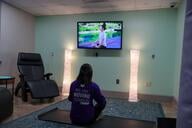You have /5 articles left.
Sign up for a free account or log in.

Istockphoto.com/ridall30
As an undergraduate, I seldom felt overwhelmed by coursework. I found praise easily. I wrote an award-winning honors thesis and graduated summa cum laude. When I heard horror stories about graduate school, I knew I would be an exception. I was wrong.
Although I lost 10 pounds in my first semester in Southern Methodist University’s history Ph.D. program from the stress of coursework, I want to avoid being all doom and gloom. I can confidently say that I have never learned so much in such a short period of time.
After my first semester of coursework at the university, 12 significant lessons particularly stand out. I hope this list will prove beneficial for other current and future Ph.D. students.
Graduate school shows you that you’re capable. In 2012 and 2013, I hiked roughly 1,000 miles on the Appalachian Trail and almost 2,000 miles on the Pacific Crest Trail. Graduate school, sans all the walking, is reminiscent of these long-distance treks: I am constantly hungry and look like I’ve been living in the woods. Yet the most striking similarity is that I am constantly surprised by my capabilities. Never did I think I could write for seven hours straight. With deadlines looming, I can. Never did I think I could read five books in a week. With fear of disappointing a professor, I do. I am both excited and scared to continue discovering my capabilities.
It helps to create another bubble. I began a romantic relationship when I moved to Dallas. Initially, I thought it foolish to date as I began a Ph.D. program, but my significant other allowed me to step out of the academic bubble. We went hiking, we saw movies, we enjoyed the symphony. To remain mentally sound in graduate school, you should maintain a world outside it. For me, that turned out to be a romantic relationship. For others in my cohort, it means being active with church, with sports or with family. That burgeoning relationship has since ended, teaching me another valuable lesson: maintaining a relationship while in a Ph.D. program is challenging.
Money goes quickly. I am paid $20,000 over 10 months by my university, an amount below the living wage. Yet that stipend is not nearly as bad as at some public universities and is one of the best in Southwest region. Only a few of us in the program are in massive debt, not all of us.
Graduate students, besides sometimes being dirt-cheap labor, bring repute to their universities. We are trophies in the making. All universities have to do is keep us half-alive, to give us enough to pay our bills, and they can frequently fail at that. But I will say, in a twisted way, I have been so busy with graduate school that I have found myself spending less than I ever have. Books, food, gas, rent, repeat.
You may feel guilty when you don’t work. In graduate school I have become my own boss. I am a demanding boss. My biggest issue is that I rarely give myself enough free time. An hour spent grocery shopping could be spent reading a page or two of Derrida. Two hours spent rock climbing could be used to mindlessly mull over potential grants before realizing that I don’t meet any of the qualifications.
On the one hand, such guilty feelings are a boon professionally. I have produced a heap of web articles, book reviews and encyclopedia entries. On the other, those feelings can be dangerous to my well-being. I am not one of those rare academics who utterly enjoys digging into scholastic trenches. I need time to decompress.
Please correct me if I am wrong, but I think this feeling does not go away for many of us in grad school. We just become better at managing it, at buttering up our inner bosses to give us decompression time. Running every day keeps me from spiraling out of control. But when deadlines are on the horizon, skipping a run “just this once” is all too easy.
You should gut, gut, gut -- but not too much. When tasked with reading 1,500 pages in the span of a week, you gut. You hit chapter intros and conclusions, you read topic sentences, you scrounge up dusty reviews. But I’ve found that when I gut something, I hardly enjoy it. “Survival reading” washes away nuances. Therefore, I’ve made it a rule to read at least one book front to back per week. I always have plenty of options to choose from.
Your butt will hurt. Really, my butt hurts. Graduate school is a sedentary occupation. I sit all day.
Sometimes what you wear matters. I showed up to my first slate of classes in flip-flops, board shorts and a T-shirt. Dallas is hot. Comfort is key. When it got cooler, I started wearing button-ups, jeans and boots. After doing so, I felt taken slightly more seriously. The university’s program is inclusive. No one in the department wants their students or peers to feel uncomfortable. But perhaps unconsciously it is easier to see someone as an academic when they look “academic.”
It’s important to prioritize your future. In undergrad, grades are important. In graduate school, they are less so. Some people may even venture that grades are insignificant on the path to a Ph.D. But that’s an overstatement. By putting in the hours and acquiring acceptable marks in graduate school, I am training myself to work diligently in the future. I am training myself to be dependable. That I impress my professors and peers is a wonderful side effect.
At the same time, if I focused solely on coursework, I’d be setting myself up for failure on the job market. Grades rarely lead to a professorship -- they just get you closer to a Ph.D. My prioritization, therefore, is constantly tested. I ask myself, when is taking a hit to my grades acceptable? Do I risk burning out or do I give myself a much-needed weekend vacation? Do I finish an op-ed or do I carefully read a book for class discussion?
Pathways in my brain, trained from undergraduate days, tell me that grades are everything. But prioritizing writing articles, op-eds and reviews that relate to my field seems like an objectively wiser investment of my time. I could have spent 16 hours perfecting an essay on The Jungle. Instead I leeched eight of those hours to write this article.
Nearly everyone is brilliant. Once a big fish in a small pond, the pond has expanded exponentially, and I have become a shrimp. My cohort of five, brilliant. My professors, brilliant. Most everyone here is brilliant.
Depression is prevalent. This comes as no surprise. Graduate students are overworked, isolated and poor. In my field of history, we also tend to read an absurd amount about destruction, death and disaster.
My program has an incredibly supportive graduate community -- the people are a large reason why I came here -- yet depression among grad students is still rampant. Our heads are savagely hit with the fact that our aspirations to become professors are increasingly ludicrous in the face of a dismal job market. And yet we push on. While depression is prevalent, so too is resilience.
Flexibility is vital. When I led my first class discussion on George Chauncey’s Gay New York, it went mediocrely. I forgot a cardinal rule of being a dungeon master in Dungeons & Dragons: be open to improvisation. I had read Gay New York cover to cover. I had spent weeks condensing down all of Chauncey’s arguments into tidy points that flowed from one to the next. I had a concrete list of questions, and, by God, I had no intention of diverting from that list.
Yet competent dungeon masters know that a purely railroaded adventure in D&D is a drag. Similarly, skilled discussion leaders expand on classmates’ ideas; they don’t brush them aside for their own. Class discussions need frameworks; they need signposts. But in my strictness, I’d never let real conversations take place. I had to learn to be flexible and adaptable.
“Ph.D. student” carries weight. In our profession, Ph.D. students are a dime a dozen. We are often perceived as being on the lowest rung of the totem pole, constantly scrounging for publications and relentlessly networking. But when someone outside academe asks me what I do, and I say, “I’m a Ph.D. student,” I receive an, “Oh, wow!” I live for the “Oh, wows.” They break the spell of impostor syndrome; the “Oh, wows” make me proud of where I landed.
Again, I hope these lessons prove helpful to others in a position similar to mine. With the first semester of my Ph.D. program finished, I am pleased with what I achieved -- and endured.




